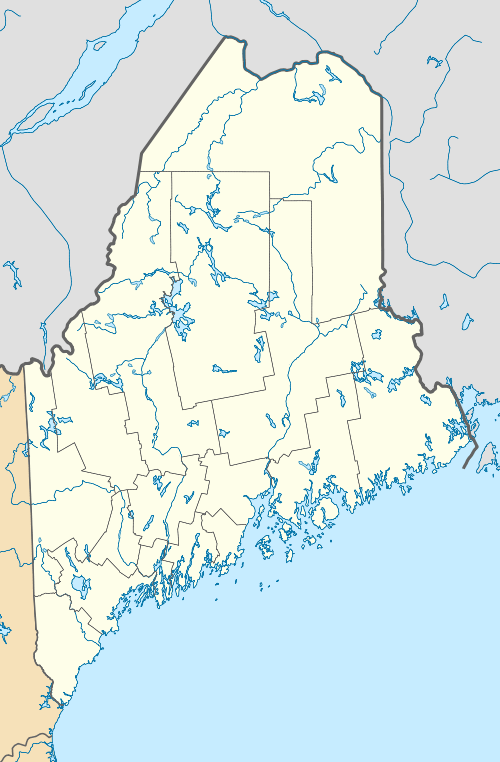F.O.J. Smith Tomb
|
F.O.J. Smith Tomb | |
|
| |
  | |
| Location | Pond and Ash Aves. in Evergreen Cemetery, Stevens St., Portland, Maine |
|---|---|
| Coordinates | 43°40′50″N 70°18′40″W / 43.68056°N 70.31111°WCoordinates: 43°40′50″N 70°18′40″W / 43.68056°N 70.31111°W |
| Area | 0.3 acres (0.12 ha) |
| Built | 1860 |
| Architectural style | Egyptian Revival architecture |
| Part of | Evergreen Cemetery (#92000791) |
| NRHP Reference # | 74000166[1] |
| Added to NRHP | December 31, 1974 |
The F.O.J. Smith Tomb is an historic tomb in Evergreen Cemetery in Portland, Maine. It is the tomb of Francis Ormand Jonathan Smith (1806–76), US Congressman 1833-39.[2] It was probably built by Smith in 1860, at the time of his daughter Lizzie's death, and is one of Maine's most sophisticated expressions of Egyptian Revival architecture. It was added to the National Register of Historic Places in 1974.[1]
Description
The Smith tomb is located near Pond and Ash Avenues in the western portion of Evergreen Cemetery, a rural cemetery in Portland's western Deering neighborhood. The tomb is a granite structure, most of which is covered by a mound of earth, leaving only the front facade. It is in the form of an Egyptian pylon, mostly fashioned out of roughly finished granite blocks, topped by a projecting rolled cornice. Dressed stone caps the sloping sides of the facade, and forms the pylon-shaped entrance to the tomb. A sun disk motif is set above the cornice that tops the doorway, above which a panel is set with "F.O.J.S." in raised relief. The door to the tomb is marble, and bears the following inscription:[3]
NATURE teaches that All Flesh Must Die. RELIGION inspires Hope that all Spiritual Beings will live forever, in spheres and forms to which they are fitted. Believe in GOD, and fear not to leave wholly to Him the Great Future. His plans for Heaven as for Earth must be All-wise, Benevolent and Immutable. All men can know of future life.
History
Francis Ormand Jonathan Smith was one of Maine more colorful political personalities of mid-19th century. He controversially opposed a state lottery to fund the Cumberland and Oxford Canal, and was politically peripatetic, supporting Whigs, Democrats, and Republicans in both his political and journalistic activities. He was an early advocate of the telegraph, supporting the work of Samuel F.B. Morse, and engaged in a number of high-profile failed business ventures.[3]
His tomb was built on his Portland estate about 1860, around the time when his daughter Lizzie died. In 1876, when his estate was subdivided after his death, the tomb and its contents were moved to Evergreen Cemetery. The design is believed to be Smith's.[3]
See also
References
- 1 2 National Park Service (2010-07-09). "National Register Information System". National Register of Historic Places. National Park Service.
- ↑ The Political Graveyard: Index to Politicians: Smith, E to F
- 1 2 3 "NRHP nomination for F.O.J. Smith Tomb" (PDF). National Park Service. Retrieved 2016-03-14.